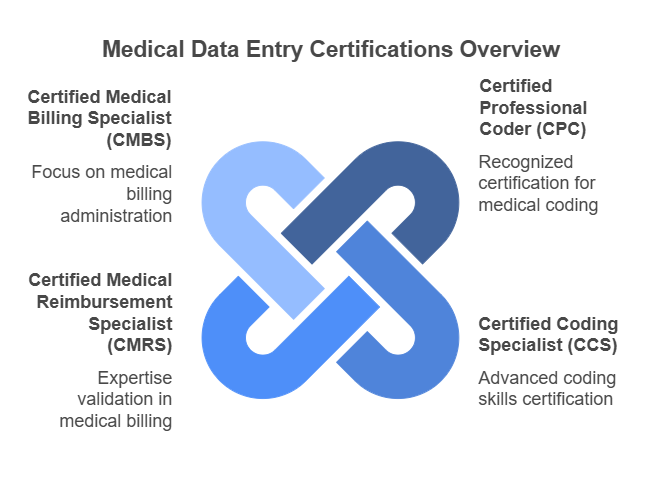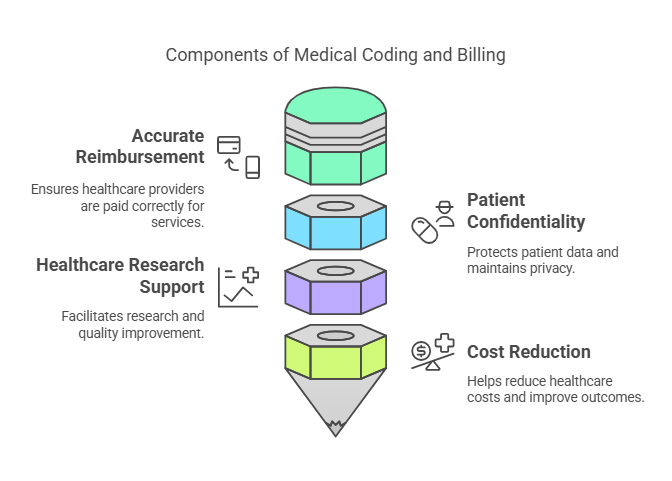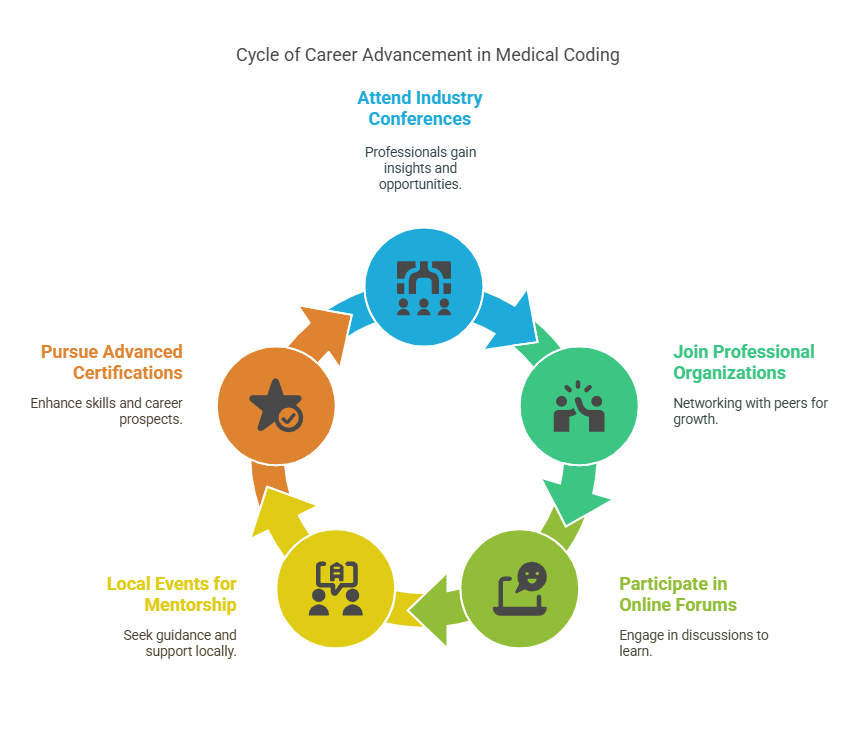Medical Data Entry Certification
Medical data entry is the process of accurately and efficiently entering patient information into electronic health records (EHRs) and other healthcare systems. It plays a crucial role in ensuring that patient data is accurate, up-to-date, and easily accessible. Professionals in this field work closely with healthcare providers, medical coders, and health information technicians to maintain compliance with healthcare regulations.

Obtaining a medical data entry certification is essential for professionals looking to advance their careers in medical coding, billing, and health information management. These certifications validate expertise and improve employability in the field by demonstrating proficiency in medical terminology, coding systems, and billing procedures.
Role of Medical Data Entry in the Healthcare Industry
Medical data entry professionals, including those with medical billing and coding certification from AMBCI, are responsible for processing patient claims, managing medical records, and ensuring compliance with healthcare regulations. Their work allows healthcare providers to make informed decisions, leading to improved patient care. Accurate data entry also supports research initiatives and policy development within the healthcare sector.
Overview of Medical Data Entry Certifications
Medical data entry certifications serve as credentials that validate an individual’s ability to accurately process medical records, claims, and billing information. Some of the most recognized certifications include:
Certified Professional Coder (CPC) – Offered by AAPC, this certification is widely recognized in medical coding.
Certified Coding Specialist (CCS) – Offered by AHIMA, this certification focuses on advanced coding skills.
Certified Medical Reimbursement Specialist (CMRS) – Validates expertise in medical billing and reimbursement.
Certified Medical Billing Specialist (CMBS) – Focuses on the billing aspect of medical administration.
These certifications are widely recognized by healthcare providers and employers across the industry, improving job prospects and salary potential.

Education and Training Requirements
Associate’s Degree in Medical Billing and Coding
Associate degree programs in medical billing and coding typically take two years to complete. They cover essential topics such as medical terminology, coding systems (ICD-10, CPT), and healthcare regulations. These programs prepare students for entry-level positions and provide a foundation for advanced certifications.
Online Medical Coding and Billing Programs
Online programs offer flexibility for students balancing work and education. These self-paced courses provide training in medical terminology, coding systems, and billing procedures. Many institutions offer certification preparation courses, helping students get ready for certification exams.
Self-Paced Courses and Training Programs
For those looking for flexibility, self-paced courses are an ideal option. They cover key areas like medical coding, billing procedures, compliance, and regulatory requirements. These programs help individuals prepare for certification exams while allowing them to learn at their own speed.

Medical Coding and Billing Fundamentals
Medical coding involves assigning standardized codes to medical diagnoses and procedures for billing and insurance claims. Medical billing, on the other hand, ensures that healthcare providers receive reimbursement for services rendered. While coding requires a deep understanding of coding systems like ICD-10 and CPT, billing involves managing insurance claims and patient payments.
Importance of Medical Coding and Billing
Accurate medical coding and billing are essential for:
Ensuring proper reimbursement for healthcare providers.
Maintaining patient confidentiality and data security.
Supporting healthcare research and quality improvement initiatives.
Reducing healthcare costs and improving patient outcomes.

Career Opportunities in Medical Data Entry
Medical coders and billing specialists can work in hospitals, clinics, physician practices, insurance companies, and government agencies. Responsibilities include assigning medical codes, submitting claims, and managing patient payments.
Employment Outlook and Salary Information
According to the 2025 Bureau of Labor Statistics (BLS), the demand for medical coding professionals is expected to grow by 11% through 2033. The median annual salary for medical coders and billers ranges from $45,000 to $70,000, depending on experience and location. Those with advanced certifications can earn even higher salaries and move into leadership positions.
Growth Prospects in the Medical Data Entry Field
With an increasing demand for healthcare services and digitized medical records, the medical data entry field offers significant career advancement opportunities. Professionals can advance to leadership roles, become compliance officers, or specialize in healthcare auditing.
Certification Options for Medical Data Entry
Several well-known certification programs validate expertise in medical coding and billing:
Certified Professional Coder (CPC) – Covers advanced coding skills.
Certified Coding Associate (CCA) – Demonstrates expertise in coding and health information management.
Certified Billing and Coding Specialist (CBCS) – Focuses on billing and claims processing.
To earn these certifications, candidates must pass an exam that tests their knowledge of medical terminology, coding systems, and healthcare regulations. Some certifications also require work experience or formal education.
Benefits of Certification
Certification demonstrates expertise and commitment to the field, increasing job prospects and salary potential. It also provides opportunities for career advancement and continuous learning.
Medical Records and Data Entry
Accurate medical records are essential for high-quality patient care and regulatory compliance. Medical data entry professionals must be detail-oriented and knowledgeable about coding systems to ensure accuracy.
Best Practices for Medical Data Entry
Use standardized coding systems to maintain consistency.
Stay updated with changes in healthcare regulations.
Ensure the confidentiality and security of medical records.
Career Advancement and Networking
Networking Opportunities
Professionals can enhance their careers by attending industry conferences, joining professional organizations, and participating in online forums. Networking helps in finding job opportunities and gaining industry insights.
Local Chapter Networking and Events
Local events provide medical coding professionals with opportunities for mentorship, job search assistance, and continuing education.
Advanced Certifications
Pursuing advanced certifications like Certified Professional Medical Auditor (CPMA) or Certified Physician Practice Manager (CPPM) can further enhance career prospects.

Employment and Job Search Strategies
Employment Tools and Resources
Medical data entry professionals can utilize job search websites, career counseling services, and networking events to find job opportunities.
Job Search Strategies
Tailor resumes and cover letters to specific job openings.
Practice interview skills.
Stay updated with industry changes to remain competitive.
Fast-Tracking a Coding Apprenticeship
Fast-tracking an apprenticeship can provide on-the-job experience, increasing job prospects and skill development.
Salary and Benefits for Medical Data Entry Professionals
Salaries vary based on experience, location, and certification. On average, medical coders earn between $45,000 and $70,000 per year. Experienced professionals can earn higher salaries and move into leadership roles.
Perks of a Career in Medical Data Entry
Job security and career stability.
Opportunities for career advancement.
Access to continuous education and professional development.
6 Less-Known Facts About Medical Data Entry
AI and Automation Are Enhancing the Field – AI tools are increasingly assisting with medical data entry, reducing errors and improving efficiency.
External Link: AI in Medical Data EntrySome Certifications Require Continuing Education – To maintain certifications like CPC and CCS, professionals must complete continuing education credits.
External Link: AAPC Continuing Education RequirementsRemote Work Opportunities Are Expanding – Many medical coding and billing jobs can now be done remotely.
External Link: Remote Medical Coding JobsSpecialized Certifications Can Lead to Higher Pay – Certifications in auditing, compliance, or specific coding systems can increase earning potential.
External Link: AAPC Specialty CertificationsMedical Coding Can Be a Stepping Stone to Healthcare IT – Experience in data entry can lead to roles in healthcare information technology and systems management.
External Link: Medical Coding to Healthcare IT CareerEmployers Prefer Certified Professionals – While certification is not always mandatory, certified professionals are more likely to be hired and promoted.
External Link: Benefits of Medical Coding Certification
FAQs About Medical Data Entry Certification
-
While certification is not always required, it significantly improves job prospects and salary potential.
-
Most certification programs can be completed within 6 to 12 months, depending on the program and study pace.
-
Yes, many employers offer remote work options for certified medical coders and billing specialists.
-
The Certified Billing and Coding Specialist (CBCS) or Certified Coding Associate (CCA) are great starting points.
-
The demand for medical data entry professionals is expected to grow 11% through 2033, making it a stable career choice.
A career in medical data entry offers excellent job stability, competitive salaries, and opportunities for advancement. With the increasing digitization of healthcare records, now is a great time to enter the field.
